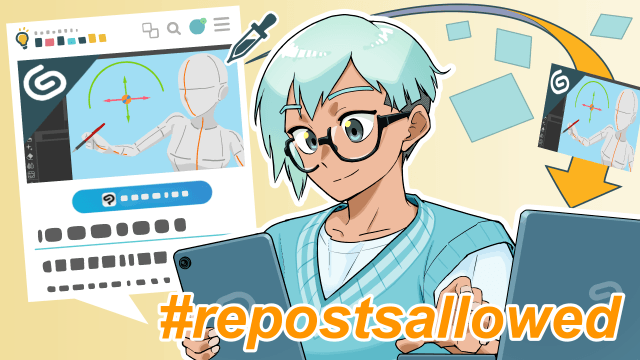Creating background with 3d primitives
Intro
3d primitives are basic 3d object that can be used to develop bigger and more complex 3d materials, primitives can be used as building blocks to create larger objects. In this tutorial I will explain how clip studio primitives can be used to create simple objects and backgrounds
Clip studio primitives are just basic objects like cube, plane etc. To open the primitive folder on CSP, just go to the material folder and click on 3d folder to find the primitives
Once you open click on the primitive icon you should see this;
Note: I used the Android version of CSP for this tutorial.
Drag and drop any primitive you want to work with and then you are good to go.
Basic primitives operations
Before you can work with CSP primitives you must know the basics of using it.
Once your primitive is on the canvas, you can view it from different angle tweaking its view.

To move or adjust the length/width of the primitive, click on it and drag the icon that appears afterwards.
Timelapse:

To do more in-depth setting like dividing the primitive,adding color click on the setting icon.
A window will pop-up once you click the icon, select primitive 1 to edit some of the primitive settings.
You can adjust the number of divisions on the primitive by adjusting the bar
Click on the 'object color' icon to change the color of the primitive. Your selected colour will be the color of the primitiv

Texturing 3d primitives
You can add textures to your 3d primitive, both textures from the CSP materials or from your device can be used.
I explain how I use this brick texture that I created on CSP to texture a cube primitive.
First click on the setting icon and reduce all the number of divisions to 1

You will get a plain cube once the division are gone
Click on the open icon to import your created texture or textures in your device files.
You can also import already made textures from the material catalog.
Once you click on the open icon you will be able to select which texture you want to use, click open once you have select the texture the primitive will display it automatically.
Here is the timelapse and result of the process

If you're not cool with the way the texture turns out you can edit it by going to the texture setting.
I used "repeat" as my tiling. Adjust the scale ratio and position till you get your desirable result.

Primitives as building blocks
Primitive is very useful for creating simple objects that might be difficult to draw, I mainly use primitive to create objects that I want to draw from different angle.
Since i've already explained the basic operations of CSP 3d primitive, using them as building blocks will be very easy.
I modelled something like a truck using cube and prism primitive to get this;
You will of course have to modify it when you are turning it to lineart. In my case I extracted the lineart using the layer property function.
Note: you will have to redraw it and add little details if you want to make it look like a truck. Primitives will only act as a framework you will have to make it look better.
Another example; I designed a throne using cube primitives and I removed all the divisions to make it look plain.
When creating an object using primitives, it is important to create everything in one layer so that you will be able to view the object from different angles.
Creating background with 3d primitives
Once you know the basic operations of 3d primitives, creating background with them will be super easy. I used 3d primitive to create this background without even sketching or painting using the following textures;
Though I painted some shadows and lights the whole background was made with 3d primitives to get this result
Here is the timelapse for the process;

Conclusion
Primitives is a very faster and easier way to create your background, it even comes handy when you're trying to figure out perspective.
I hope you find this tutorial helpful. Good luck.























Comment